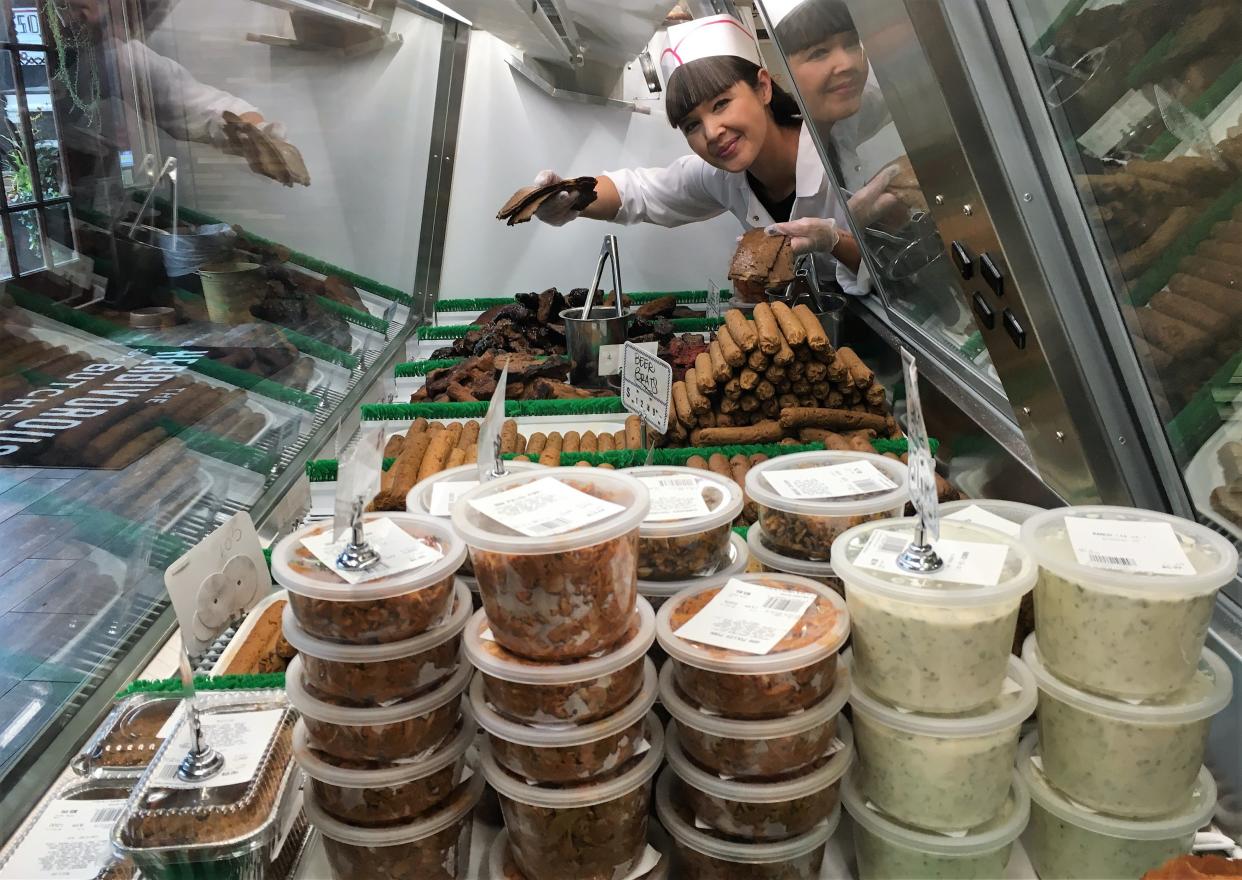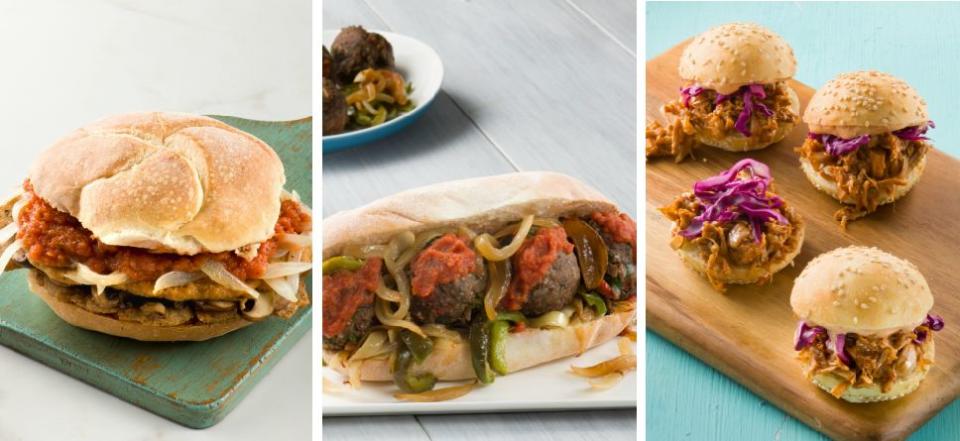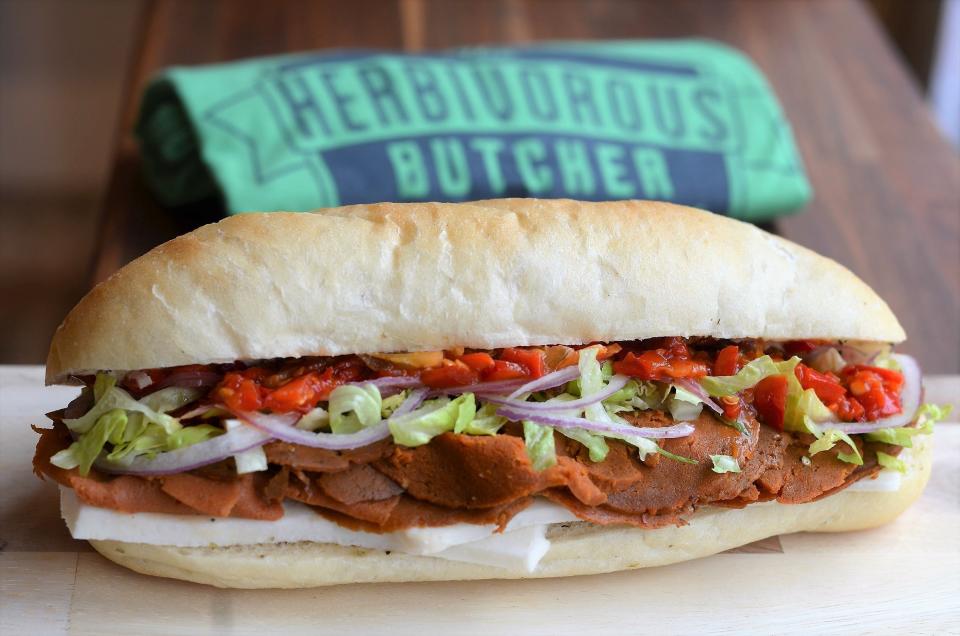Meet The Butcher Shop Of The Future: It Sells No Meat Whatsoever

Push open the door of your new neighborhood butcher shop and hear that friendly little bell announcing your arrival. Check out the gleaming white walls, the big glass display cases and the wide array of sausages, meats and prepared items. As you’re chatting with the friendly, white-aproned butcher behind the counter, you might start placing your order for a few pounds of Italian sausage, a to-go container of Korean ribs and some pastrami for sandwiches this week. The butcher, after handing over your paper-wrapped packages, thanks you and says she hopes to see you next week. You head outside with your purchases, looking forward to some delicious, protein-rich meals in the days ahead.
And here’s the thing: There isn’t a scrap of animal protein in anything you just ordered. No beef, no chicken, no eggs, no cheese. That new shop you just visited is one of a wave of vegan butcher shops popping up in the United States, Canada and Europe. People for the Ethical Treatment of Animals (PETA) estimates that in one year, the number of vegan butcher shops in North America has quadrupled, from two to eight. With online ordering and in-grocery options, it’s now possible for anyone, anywhere, to try vegan meat.
While these purveyors look like traditional meat butchers, they’re actually using plant proteins to create deceptively delicious copycat items, using ingredients like jackfruit, seitan (cooked wheat gluten), lentils, oats, mushrooms and vegetables.
Meet the new generation of vegan butchers, who have discovered some genius hacks to trick you, your brain and your taste buds into eating more plants and consuming less meat. These meatless meat markets are selling products that look and taste just like the real thing, and people increasingly are tasting them and asking for more.
We’re trying to eat less meat
As we take a closer look at the amount of meat we eat, and the effect meat-eating has on our health and the environment, it seems as though vegan butchers’ time has come. We’re increasingly looking for ways to reduce our meat consumption, and scientists and public health officials are saying it’s a good idea. According to the Johns Hopkins Center for a Livable Future, diets high in plant-based foods and low in animal-based foods “offer significant health benefits, along with climate and other environment benefits, including more efficient use of land, water, nitrogen and other resources.”
Two out of every three Americans are eating less of at least one type of meat, according to a recent study conducted by the center. The survey also reported that 55 percent of Americans said they are reducing their consumption of processed meat and 41 percent are cutting back on red meat.
“Many Americans continue to have strong preferences for meat, but this survey adds to a growing body of evidence that a significant portion of the population may be purposefully reducing their meat consumption without becoming vegetarian or vegan,” study leader Roni Neff said in a press release.
According to research conducted earlier this year by The NPD Group, a leading global information company, in-home consumption of plant-based proteins has increased by 24 percent since 2015.
NPD Group Executive Director Kim McLynn said 60 percent of U.S. consumers “want to get more protein in their diets, but they’re increasingly mixing both meat and plant-based proteins to do so.”
The NPD study found that 14 percent of U.S. consumers, which translates to over 43 million people, regularly eat plant-based food such as tofu and veggie burgers and drink plant-based beverages such as almond milk. Te overwhelming majority of these consumers ― 86 percent ― do not consider themselves vegan or vegetarian, according to the study.
“It’s clear this category has mainstreamed beyond those who choose a meatless diet,” David Portalatin, industry advisor for NPD’s food sector, said in a press release.
But darn it, meat tastes good
Neff’s observation about our “strong preference” for meat points to one reason for the rise of the vegan butcher — for many, meat tastes good, and offering something that looks and tastes like meat is appealing to those who crave it but who want to reduce consumption of it.

“If meat weren’t so tasty, there would be a lot more vegans and vegetarians,” said Jaap Korteweg, founder of Netherlands-based The Vegetarian Butcher. “The biggest obstacle to a plant-based future is meat and dairy substitutes which lack taste. The only way to persuade consumers to part company with meat is if ‘meat’ from plants is at least as tasty.”
“The way we look at it, the majority of vegans weren’t born eating a vegan diet,” said John Tashjian, co-owner of Toronto’s YamChops, which describes itself as North America’s original vegan butcher shop. “We can offer the kinds of foods they enjoyed before, but we remove the concerns for health, environment and animal cruelty.”
The shop’s signature Szechuan beef, for example, is a consistent bestseller.
Meet your friendly vegan butchers
So here we are, wanting to eat less meat and increasingly open to the idea of including more plant-based protein in our diets. A new cadre of vegan butchers has responded to this opportunity. Most began with at-home cooking experiments that evolved into the distribution of their products at farmers markets, their own stores or grocery stores.
As a shift in the prevailing consumer attitude toward plant-based products began to occur in recent years, vegan butcher flagships like YamChops, Herbivorous Butcher in Minneapolis and No Evil Foods in Asheville, North Carolina, started selling their faux-meat wares.
With friendly attitudes and an absence of finger-pointing, vegan butchers are welcoming everyone — vegans, vegetarians, flexitarians and even those who are still brushing post-brunch bacon crumbs off the front of their shirts.
“We’re all about small, incremental steps, so we ask people to try this way of eating only one day a week,” said Sadrah Schadel, co-founder of No Evil Foods. “There’s power in a single meal. ... We want people to love the hell out of what they’re eating, and we promise this food is not the veggie burger you remember eating in 1994.”
“Our shop is for everyone,” said Herbivorous Butcher’s marketing communications coordinator Laura Van Zandt.
The business looks and operates like a traditional butcher, with an expansive meat case stocked with ribs, sausage and cheeses, all made from plants. “Our most popular items are our Korean ribs and our pastrami,” Van Zandt told HuffPost.
This particular operation is a collaboration between a brother-and-sister team, Aubry and Kale Walch. As they both explored vegan diets, they became dissatisfied with supermarket offerings and began cooking plant-based meats at home. They opened a small stand at the Minneapolis farmers market, then launched a successful Kickstarter campaign. A brick-and-mortar location opened two years ago, and a food truck was added this year.
“We’ve already outgrown our space, and we’re thinking about expanding,” Van Zandt said.

“I can be in the shop for an hour and see people of every age, race and gender come in through the door,” she said. “The majority of our customers are those who still do eat meat.”
She detailed several reasons for the shop’s growing popularity. “Some people might have been told by their doctor to cut back on meat consumption, or they may be exploring other dietary options,” she said. “We get a fair number of people who have kids home from college or vegan friends coming to visit, and they want to put plant-based meat on the menu.”
“This is no longer a trend; it’s a movement,” she added. “Animal agriculture is destroying the planet, so it’s time to look toward a plant-based diet.”
Don’t have a vegan butcher shop? Look in your grocery store
“There’s no wrong way to eat plants,” said Schadel of No Evil Foods.
Starting with home kitchen experiments (“We grew up in the punk rock and DIY scene, so we were open to experimenting,” she said about herself and co-founder Mike Woliansky), then moving to farmers markets, the company has become a manufacturer and national distributor of plant-based meat products. No Evil Foods is available online and in stores, including Wegmans, The Fresh Market, Ingles, Heinen’s and select Whole Foods markets.
“Consumer demand led us down a different path,” she said. “Instead of being in just one place with a brick-and-mortar shop, we want to be everyone’s hometown butcher by being available in the grocery and retail market, while still producing artisan-style, handmade meats.”
The approach seems to be well-timed. “Our sales are expected to be 300 to 400 percent higher than last year, and our retailer count is seven times higher,” she said.
She welcomes the way plant-protein meats are taking up more space in shopping carts and the center of the plate. “So many more vegan butchers means more awareness,” she said. “People are willing to experiment and check out it out, and the available options have improved dramatically.”
The interest in plant-based meats is just as strong — if not stronger — across the pond. The Vegetarian Butcher, located in The Hague, Netherlands, with a mission of freeing animals from the food chain by offering a complete and delicious alternative to meat, was founded in 2010 with a single shop. It now sells products in 16 countries and at over 4,000 points of sale.
It recently announced a partnership with British supermarket chain Waitrose to develop its own label of meatless meals, including tikka masala, lasagna and Thai green curry.
“It’s our goal to become the largest butcher in the world,” Korteweg told HuffPost. “Our biggest challenge is to persuade consumers, not only in Western countries but those in emerging economies such as India, China, Brazil and Russia, to experience the possibilities of a plant-based future. For humans and animals alike, it’s a matter of life and death, quite literally.”
But do people really want this?
Not everyone is completely enamored with the vegan meat trend, and some are urging caution before you tuck into those seitan sausages with utter abandon. One of those is Jill Nussinow (aka The Veggie Queen), a registered dietician and author of the cookbook Vegan Under Pressure.
“I’ve been a vegan for 16 years, and I really don’t miss meat,” she told HuffPost. “I recently visited the vegan butcher shop The Butcher’s Son in Berkeley, California. It was packed with people, but for someone like me who doesn’t want something associated with meat, it’s not appealing.”
Nussinow also cautions consumers to investigate how their vegan meats are being made. “Vegan foods can be highly processed, so read labels and ask questions,” she said.
Still, it’s clear that vegan meat is a better alternative than real meat, she said. “Getting more people to eat non-meat foods is great, but you need to be aware if what you’re eating is a whole food or if it’s a treat. Treats are great, but they’re not something you eat all the time.”
Sharon Palmer, known as the Plant-Powered Dietician, hopes that the beauty of whole plants isn’t lost in the rush for plant-based chicken-ish nuggets.
“The greatest health and environmental benefits are in eating whole foods intact,” she told HuffPost.
She cautions against eating too many foods that are focused on isolated plant proteins. She said that when you isolate nutrients in foods, you miss out on all of the beauty of that whole food — it’s fiber, phytochemicals, vitamins, and minerals — all working together in unison to provide benefits.
Still, like Nussinow, she sees that vegan meats can have a place for someone transitioning to a plant-based diet, or as an occasional treat. She also said that she also eats vegan meat from time to time: “I keep some favorite products in my freezer for nights when I get home late and starving, or as something to bring to a barbecue.”
Visit your local vegan butcher
If you’re looking to find a vegan butcher in your area, check out this list from (PETA): Vegan Butcher Shops That Are Killing It (Kindly).
When you visit, ask for a sample, ask lots of questions and look to your vegan butcher for helpful advice. Then tuck into that seitan pastrami and enjoy yourself ― for your own, and the planet’s, sake.
Love HuffPost? Become a founding member of HuffPost Plus today.

Related...
Yes, Those Are Probably Bugs In Your Paprika. Here's What To Do.
The Real Reason Brown Eggs Are More Expensive Than White Eggs
Vegetarian Protein Is Just As 'Complete' As Meat, Despite What We've Been Taught
Also on HuffPost
This article originally appeared on HuffPost.


